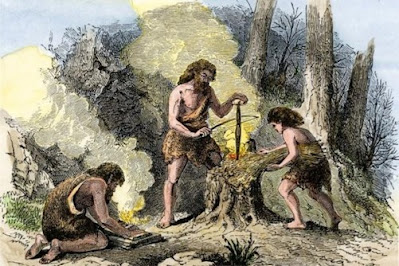The History of Cooking: From Fire to Fine Dining
Introduction
I recently read Sapiens: A Brief History of Humankind by Yuval Noah Harari, and it sparked my imagination about the origins of cooking. I pictured early humans gathered in the wilderness, their bodies tense in the cold night, watching as a storm raged above. Suddenly, a bolt of lightning struck a dry tree, setting it ablaze. The flickering flames, terrifying yet mesmerizing, marked a pivotal moment in human history. Over time, these early humans, perhaps out of curiosity or sheer necessity, learned to control this newfound power. They discovered that the charred meat left behind by accidental fires tasted different—softer, richer, and easier to eat. This was their first step toward becoming chefs.
As generations passed, they experimented, throwing different roots, leaves, and meats into the fire. Some tasted better; others made them sick. They learned through trial and error, passing knowledge down like sacred wisdom. Cooking was no longer just about survival—it became a skill, an art. And from that moment, the journey of cooking, from fire-roasted meals to gourmet cuisine, had begun.
Prehistoric Cooking: The Discovery of Fire
The earliest form of cooking likely began around 1.5 to 2 million years ago when early humans, such as Homo erectus, started using fire to cook food. The discovery of fire revolutionized human diets by making food easier to chew and digest, allowing for better nutrient absorption. Cooking also helped eliminate harmful bacteria, making food safer to eat. Early humans likely roasted meat over open flames and later learned to boil food using heated stones and natural water sources.
Ancient Civilizations and Culinary Advancements
As civilizations developed, cooking techniques and food preservation methods became more sophisticated.
- Mesopotamia and Egypt: Some of the earliest known recipes come from Mesopotamia (modern-day Iraq) around 1700 BCE, recorded on clay tablets. Ancient Egyptians used ovens to bake bread and brew beer, staple foods in their diet.
- Ancient China: By 2000 BCE, the Chinese had developed steaming and stir-frying techniques, using woks and various seasonings.
- Greece and Rome: The Greeks emphasized balanced meals and introduced the concept of professional chefs. Romans expanded on this, developing complex recipes, banquets, and even cookbooks, such as Apicius, one of the earliest known culinary texts from the 1st century CE.
Medieval and Renaissance Cooking
During the Middle Ages (5th–15th century), cooking was heavily influenced by social hierarchy. Noble households enjoyed lavish feasts with roasted meats, elaborate sauces, and exotic spices from the East, thanks to trade routes like the Silk Road. Peasants relied on simpler dishes like pottage, a thick vegetable stew.
The Renaissance (14th–17th century) brought an emphasis on refined cuisine. European chefs experimented with new flavors, and cookbooks became more widespread. Italian and French cuisine started gaining prestige, leading to the development of culinary schools.
The Birth of Modern Cooking (18th–19th Century)
The Industrial Revolution (18th–19th century) transformed cooking with new technologies such as gas stoves, canned food, and refrigeration. In France, Auguste Escoffier revolutionized French cuisine by introducing the brigade system in professional kitchens, which is still used today.
During this period, cookbooks became more accessible to the middle class, encouraging home cooking. The invention of baking powder and other food science advancements led to more diverse and efficient cooking methods.
20th and 21st Century: Globalization and Culinary Innovation
The 20th century saw rapid advancements in food production, transportation, and culinary techniques. The rise of fast food, processed foods, and convenience cooking changed global eating habits. However, the latter half of the century also saw a resurgence in traditional and artisanal cooking methods.
With globalization, cuisines from around the world became more accessible, leading to fusion cooking and culinary experimentation. The 21st century has focused on sustainability, organic foods, and health-conscious eating, with innovations such as molecular gastronomy and plant-based cuisine gaining popularity.
Conclusion
Cooking has come a long way from the discovery of fire to the modern-day culinary arts. It reflects cultural identity, technological advancements, and human ingenuity. As food science and culinary traditions continue to evolve, cooking remains a vital and dynamic part of human history, uniting people through the universal love of food.



